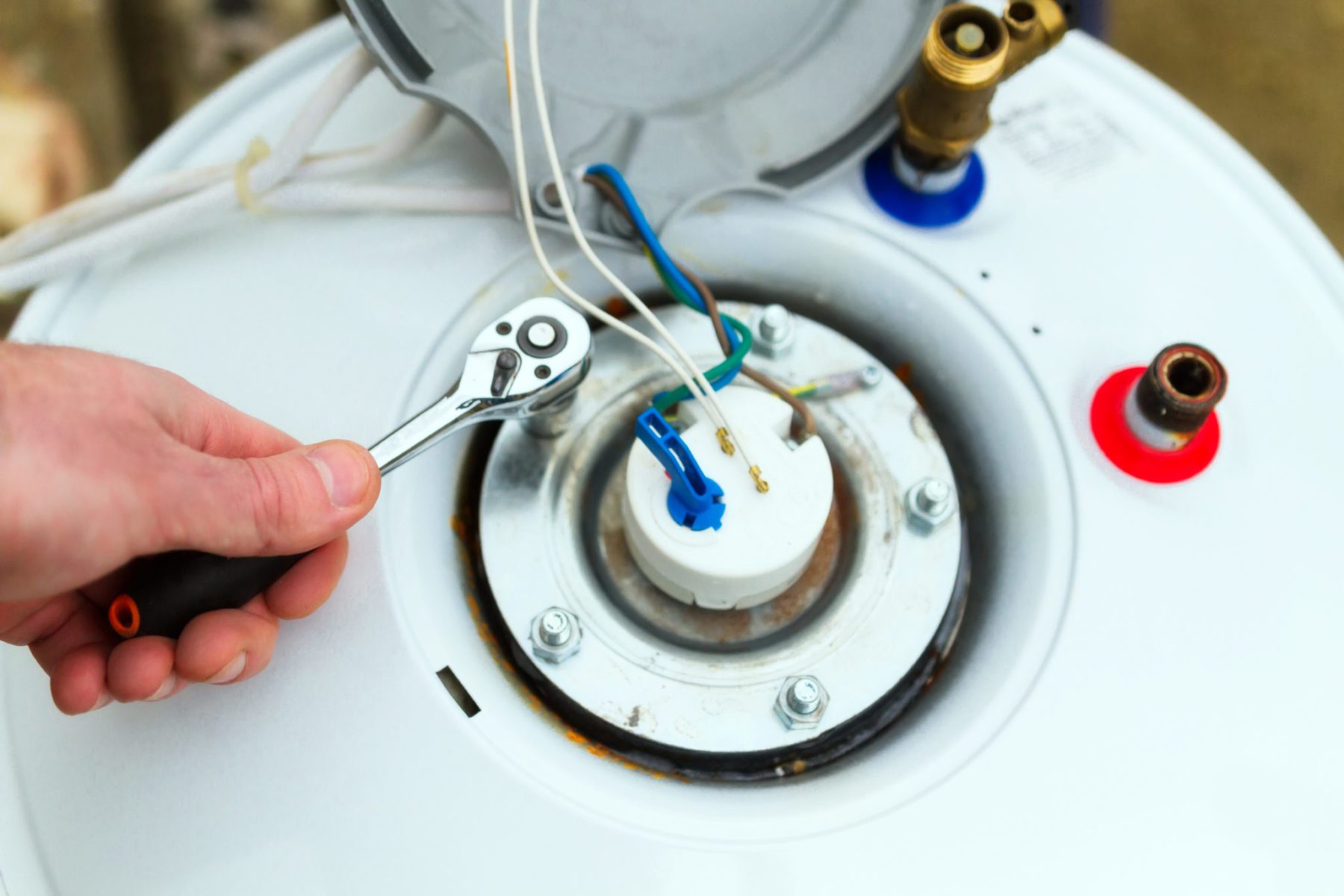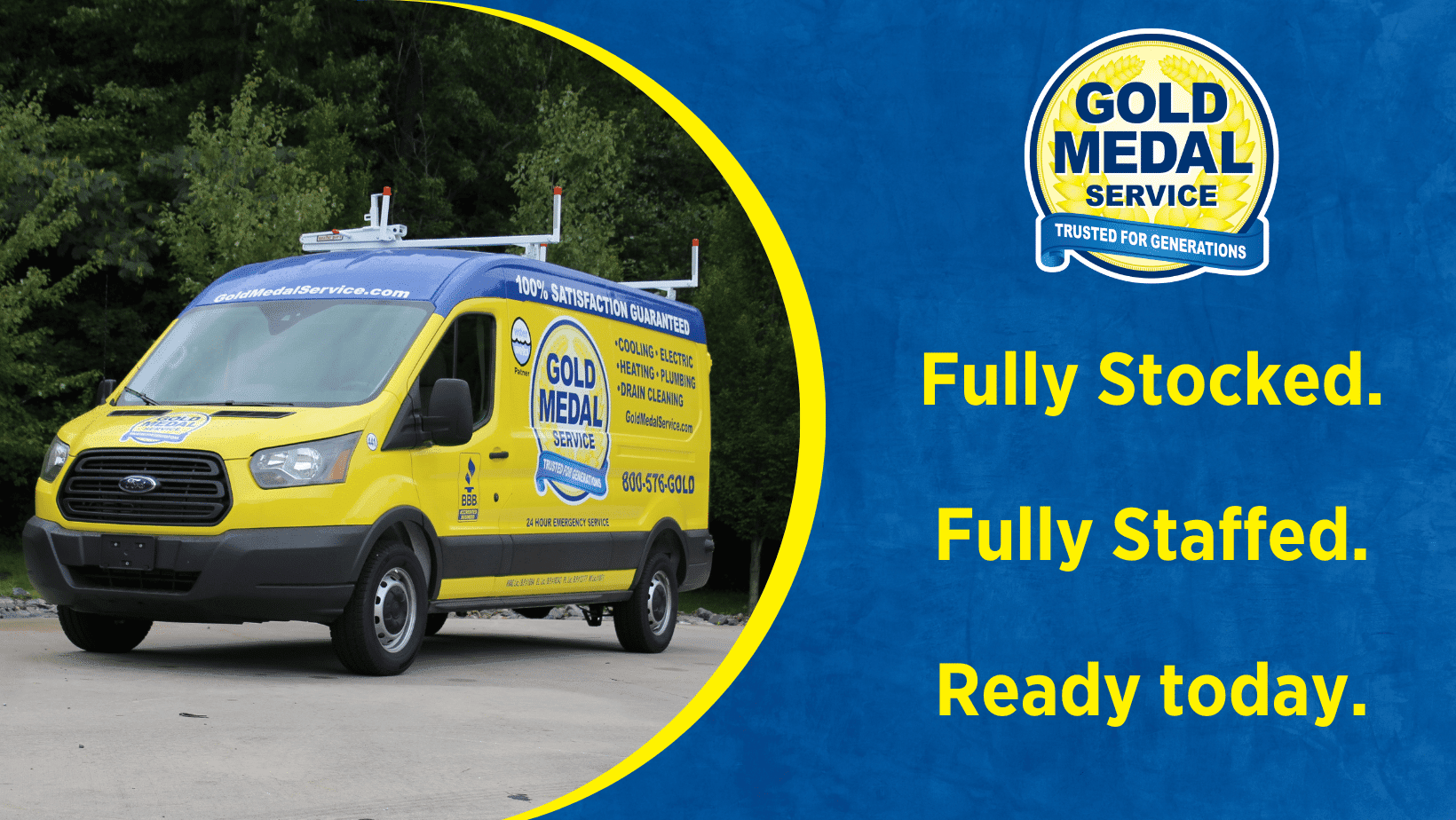
Water heater sacrificial anode rods are metal rods generally screwed into the top of the tank that attracts corrosive elements in the water. They are “sacrificed” for the healthy survival of your steel-lined water heating tank.
As a general rule, magnesium anode rods work better than aluminum/zinc anode rods but don’t last as long. In any case, water heater anode rods are essential for protecting your tank from corrosion, but they eventually wear out after around 3-5 years, depending on many factors including the hardness or softness of your water.
Without a working anode rod, your water heater tank will be vulnerable to rust, corrosion, and other damaging effects of chemicals and minerals in your water supply.
Here’s a diagram showing the inside of your storage water heater and where sacrificial anode rods come into play:
How Does a Sacrificial Anode Rod in a Water Heater Work?
In order for the anode rod to work correctly in a water heater, the anode rod must possess a lower, more negative, electrochemical potential than that of the water heater’s steel composition to be protected. All metals have a negative voltage, but the lower the voltage (more negative), the more active the metal is considered to be.
The negatively charged electrons create a higher voltage to flow from the anode rod to the steel tank causing the anode rod to corrode instead of the steel water heater tank, or other exposed metals such as electric elements. Another way to think of anode rods is that they are “weaker” metals, which take the brunt of the corrosive elements before the stronger metals that make up your water heater tank.
What Metals Are Used in Sacrificial Anode Rods?
Sacrificial anodes are usually made from relatively pure active metals, such as magnesium, aluminum, or zinc. These more active metals (anodes) oxidize and corrode much faster than the less active metals (cathodes).
- Magnesium generates around -1.6 volts
- Aluminum generates around -1.1 volts
- Zinc generates around -1.05 volts
As a result, magnesium anode rods tend to work better (succumbs to corrosion faster), but don’t last as long as other metals.
The anode rod is “self-sacrificing” and will continue to corrode until eventually it must be replaced. When there’s no sacrificial metal left on the anode, the tank can rust out, eventually causing it to burst.
Tips & Insights: Should I Repair Or Replace the Sink In My Bathroom?
How Long Do Water Heater Anode Rods Last?
Eventually, the anode rod will completely decay, which is when you should have it replaced. When it “dies,” your water heater tank will be under direct attack from all the corrosive elements in the water. Corrosion is exacerbated even further by high temperatures.
Anode rods generally can last about three to five years but it really depends mostly on the quality of your water and how much water travels through your water heater.
How to Check the Sacrificial Anode Rod in Your Water Heater
It’s highly recommended that you periodically inspect your water heater’s anode rod, which can be done during your annual plumbing inspection. By checking the status of your anode rod every 2-5 years, you can know when it’s time to replace it before it completely disintegrates.
In order to check the anode rod in your water heater, make sure you turn off the water supply as well as the power (from the circuit breaker) first. For specific instructions, consult the user/owner’s manual. After consulting the diagram in your user manual, you’ll want to drain the water heater a little bit below where the anode rod is positioned. If you have any questions whatsoever, contact your professional plumbers at Gold Medal Service.
Top 10 Signs You Should Replace Your Anode Rod
- Extends the lifespan of your storage water heater. It costs a lot less to replace an anode rod than an entire water heater.
- Water softeners can accelerate anode rod corrosion. Check your anode rod more frequently if you have a water softener (about once a year). Ask your plumber about non-sacrificial, electrical anode replacements as an alternative to sacrificial anodes.
- Acidic water can accelerate anode rod corrosion. If you have acidic water, check your anode rod more frequently (about once a year).
- The water heater makes loud or multiple popping noises when heating up – signaling potential corrosion and hardened mineral sediment.
- Your water heater is more than 5 years old. You can check the label on the side of your water heater to discover its age. Sometimes, the water heater’s age is hidden in an alphanumeric code. Check the water heater manufacturer’s website for instructions on reading the serial number.
- Your faucet aerators appear to clog more frequently. Also, if you notice a slimy gel substance when cleaning the faucet aerator.
- Your hot water starts emitting a “rotten egg” odor.
- Water is colder or not as hot as usual. The cause can be a failing heating element, broken down parts, or excessive sediment at the bottom of your unit.
- When your sacrificial anode rod is nearing the end of its life, corrosion can begin to occur in your water heater tank. If you notice rusty-looking water, a corroding water heater unit can be the cause. Contact a plumber immediately before cracks and leaks start to develop.
- One obvious sign of a problem with your water heater is a leak or obvious cracks/corrosion. If you see water around your water heater, contact a professional plumber ASAP. You don’t want to wait until the tank bursts to seek professional help!
Tips & Insights: What Are the Advantages of Using Brass Pipes in a Home?
Bursting water heaters can be a mess to clean up and water can damage the inside of your home. By replacing your anode rod every 3-5 years, your water heater can last well over 20 years without any risk of leaks and resulting water damage.
Unfortunately, if you ignore this important water heater maintenance task, you may need to replace the entire water heater after only 10 years of use. Tankless water heaters don’t have sacrificial anode rods and therefore don’t need anode replacements.

Water Heater Repair and Installation Services
Our team of local plumbers in Paterson, NJ and other areas have the tools necessary to replace the anode rod in your water heater. Our technicians provide exceptional water heater repair and water heater installation services for homeowners in your local neighborhood.
Our staff also offer other types of plumbing services such as sewer camera inspection, gas line repair, drain cleaning, and sump pump installation. Contact the team at Gold Medal Service to receive support with a malfunctioning hot water heater and other plumbing issues in your house. The key to a long-living and healthy home is preventative maintenance. Call Gold Medal Service for professional solutions to all your electrical, plumbing and HVAC needs.


